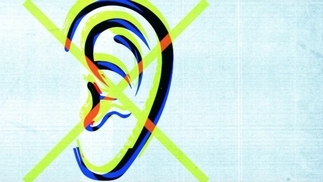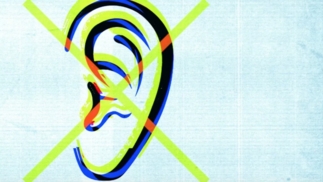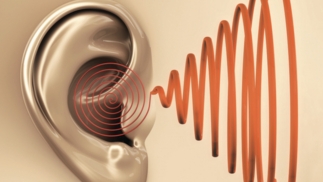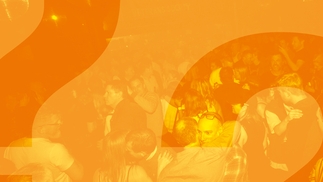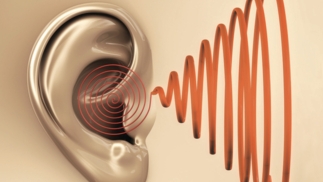Hearing damage: A DJ's guide to preventing tinnitus
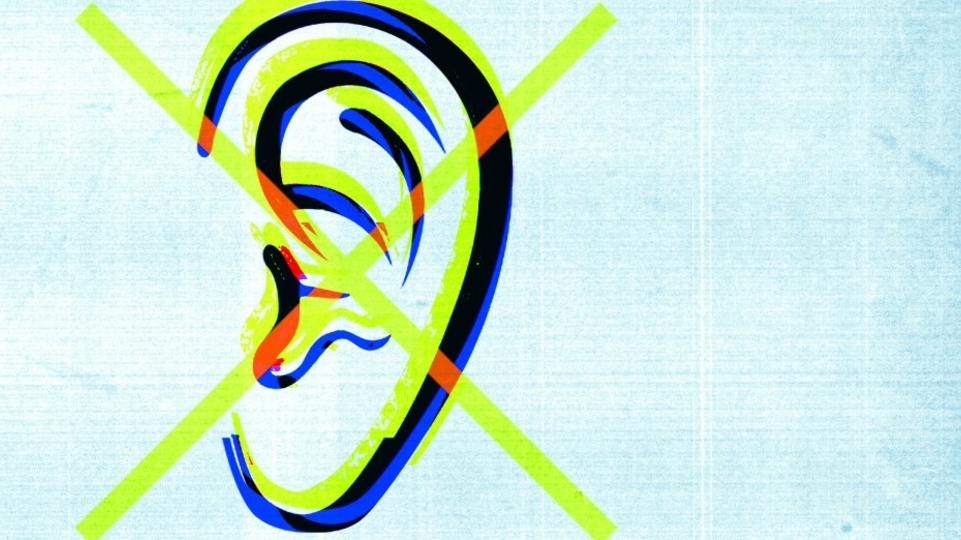
Simon Baker was a successful DJ/producer who had releases on labels such as Kompakt, Cocoon and Last Night On Earth. But then he developed tinnitus, and his life changed. However, rather than wallowing in misery, he started to find out all about how to treat the condition before re-training as a craniosacral therapist in order to help others experiencing tinnitus. Here’s his story.
Words: Simon Baker
I had what you could call a dream career. From resident DJ at Leeds’ legendary Mint Club to headlining parties around the world and releasing music on some of the most respected labels in house and techno; over 20 years as a DJ, producer, audio engineer and touring DJ, I achieved more than I ever imagined when I first bought my set of turntables.
I can pinpoint the moment things really began to accelerate: a track of mine called ‘Plastik’ was originally released in 2007 on Playhouse Records (later on Kompakt). It was incredibly well-supported and voted the second best tune of the year in Resident Advisor. It catapulted me into the limelight in an incredible way; the next thing I knew I was remixing the likes of Simian Mobile Disco and Radioslave, playing in clubs such as Berghain and Fabric, and releasing music on the likes of Kompakt, 17 Steps, Drumcode, Cocoon, Last Night On Earth and 2020 Vision, who I released my debut album with in 2011. I was on the path and I loved every minute of it. But then I developed severe tinnitus, and life changed...
“You realise there is nothing we can do to help your tinnitus or hearing damage...”
You don’t forget words like that in a hurry. This was advice from a high street pharmacy audiologist, and I’ve since learnt that most people who suffer tinnitus are told similar things. As soon as you mention tinnitus with DJing and clubs, most GPs will just tell you there is no cure and you have to learn to live with it. Trust me, this is the worst thing you can hear if you have severe tinnitus as it just sends your stress and anxiety worry levels even higher.
Stress and anxiety play a much larger role in tinnitus than many understand or appreciate. Researching, studying and understanding this has taken me on a completely different life path and encouraged me to help others and share what I’ve learnt. I am not an audiologist or an E.N.T (Ear Nose Throat) doctor, but have trained to become a craniosacral therapist. My discoveries are from my own journey, plus research and studies at post-graduate courses such as Professional Tinnitus Advisor training run by the British Tinnitus Association. Through this journey, my life changed for the better and I want to share what I’ve learnt with as many people as possible.

UNDERSTANDING TINNITUS
Firstly, we need to understand what’s physically happening to cause tinnitus. One common way people will report tinnitus is from over-exposure to noise. We have two sets of hair cells in the cochlea; one acts as an ampli er and the second acts as sensory info to the brain. If you keep aggravating them, they get worn down. They only have so much life.
If both are damaged, then this can affect your hearing and how the sensory information is passed to the brain. It effectively causes the ear to look for the missing information – similar to a phantom limb – which causes the relay of a ringing sensation back to the brain. That is what physically happens when tinnitus sufferers experience such ringing, but to truly understand tinnitus and how to combat it, we need to understand its relationship with our central nervous system and how vital our ears are to our most natural survival re exes. Tinnitus commonly appears after an intense or long-term period of exertion, excitement, stress, challenge or change. This could be anything from losing a loved one to working overseas to taking drugs or a long legal battle. Challenges like these cause your nervous system to go into an adrenal state of red- alert known as ‘ ght, ight or freeze’ as your nervous system becomes hypersensitive and creates dramatic changes throughout your body.
Adrenaline helps us survive in dangerous situations, and a heightened sense of hearing can save our lives. A good example is a shooting scene in a movie: the villain is just out of sight. He s got a gun. The hero is bracing himself for attack. All the loud music has suddenly gone quiet, and all we can hear is breathing.
You find yourself listening to the tiniest sound; a crunch of gravel under foot, a sudden gasp just out of sight. The lm direction is imitating exactly what happens to our own perception under stress. Our focus intensifies and locks onto the slightest piece of information. Suddenly the villain knocks into something. The hero in a split-second, on the strength of this tiny piece of auditory information, will either attack or run for his life. His ears will literally determine whether he lives or dies.
This is the classic fight or flight response of the nervous system that is hardwired into each one of us. It has survived millions of years of dangerous situations to create the body you are alive in right now. It is this survival response that causes you to start tensing up with suspense as you watch the film.
Being in this adrenaline state makes your ears hypervigilant: your ears play an enormous part in the stress response, and stress plays an enormous role in the way you hear. Adrenaline causes you to become hyper-sensitive to nervous impulses that you normally would not pick up. This is the inescapable fact that everyone with tinnitus needs to understand. Most tinnitus people are living in this state of red alert all the time. If your adrenaline levels drop and your nervous system becomes calmer, your sensory perception will become less acute, and your tinnitus will ease.
In most cases, tinnitus is nothing more than hearing the noises of your nervous system because our hearing has become too switched- on and detects nervous impulses inside our head. When the nervous system settles, we stop feeling threatened by tinnitus, we come out of red-alert mode and our ears stop listening out so acutely. As our hearing turns towards calm mode we naturally stop listening to these nervous impulses, and our hearing begins to return to normal.
In my own personal experience, I knew it was the loud music stress that triggered tinnitus in the rst place. But the thing that was keeping it in my system was the everyday stresses of life. Everyone’s tinnitus is different but this was mine, and I knew I had to deal with it.
"It became clear that emotions and physical tensions were triggering this ringing in my head..."
CRANIOSACRAL THERAPY
My lifestyle at the time had a lot to do with this. I was experiencing lots of travel, unhealthy eating, drinking habits, late nights and all the partying. All these elements were making my nervous system hyper-sensitive, which was something I needed to radically change if I was to continue to enjoy music and the career I had made for myself.
Then a friend of mine recommended craniosacral therapy and how it can help with calming the central nervous system, which is directly related to the cranial nerves of the ears and bring you out of the adrenal state of ght or ight as a whole and steadily calm the overall pattern of tinnitus down. I’d been told that M People drummer Andrew ‘Shovell’ Lovell was doing this type of therapy in London, so I thought he was the obvious choice as he was a fellow music head.
This introduced me to a life-changing experience. Not only did it reduce the ringing in my ears, but I felt like I could breathe again. The tinnitus didn’t disappear completely, but it subsided enough for me to feel calmer, more balanced and in control. The treatment itself is a gentle hands-on therapy that tunes into the craniosacral rhythm of the body and looks for any inbalances, tensions, restrictions or disturbances. The therapist will wait for these inbalances to flow more freely and help establish a more balanced, settled state.
This technique doesn’t just help with tinnitus but has been shown to help alleviate symptoms of anxiety, asthma, depression, chronic fatigue syndrome, insomnia, emotional issues, headaches, neuralgia, stress and many other conditions.
After a few treatments, I began to feel the gradual benefit on my hearing and started feeling different in other ways, too. I felt more peaceful, more in-tune and more relaxed. I hadn’t realised how stressed and anxious my nervous system was. Not just from tinnitus, but from everything in life that I was storing up. It became clear that emotions and physical tensions were triggering this ringing in my head and the more I continued on this path, the more I learnt about my own body and how to listen to it.
I learned how to meditate, began to practice yoga and mindfulness and started to see life with more clarity. Through this new perspective, I found the link that was missing and developed a positive mindset that allowed me to let go of the ringing in my ears. It’s about learning to shift the focus away from your hearing and negative thinking and learning how you can settle your nervous system with the support of therapy, becoming more in-tune with your body and understanding how much time and how much you have to invest in this personally for it to work.
Those first symptoms of tinnitus (however it comes) — when the ringing after a gig never really seems to go away — are some of the scariest moments you’ll experience if you do begin to suffer the condition. But the most important thing I’ve learnt is not to let this cause yourself undue stress. It’s easy to be affected by the amount of negative and fearmongering information about how irreparable the condition is, but there are alternatives to help you let go — that can change the way you live your life and how you feel about yourself and situations you find yourself in.
I wanted to share my knowledge and help others feel good, so began training as a craniosacral therapist at the College of Craniosacral Therapy in London and I can safely say that this has, by far, been the most rewarding and ful lling experience of my life to-date. I rarely hear the tinnitus anymore... And I still have what you could call a dream career.

WAYS TO PREVENT TINNITUS
•Protect your ears! Ear-plugs are so easy to nd and you don’t have to pay lots of money for the moulded ones. It’s not always easy, especially when you’re DJing, but you do become accustomed to them and should be used as often as possible.
•Be aware of how loud you have your monitors, headphones and speakers etc. Try not to put your ears under any unnecessary stress.
•Lifestyle and diet play a role in tinnitus. Too much caffeine, alcohol and drugs all raise your adrenaline levels and therefore potentially make you more sensitive to tinnitus.
•Tinnitus commonly appears after an intense or long-term period of exertion, excitement, stress, challenge or change. Consequently, most people start noticing symptoms after a period of stress, losing a loved one, an accident, an operation, taking drugs or listening to loud music over long periods. Bare this in mind if you notice the symptoms, and don’t panic.
•Most importantly, get your ears tested regularly. You may have some hearing damage (in which case hearing aids/ audiologists can help), or you may have build-up of excess wax which could need removing. Over-excessive wax can also cause your ears to ring louder. Don’t wax your own ears with hopi candles or by sticking anything in them. That can just make things worse. Use olive oil drops (or the stuff you can buy) over a week or so and the wax will excrete naturally. Bare in mind wax is vital for your ears and is usually fine left alone.
WAYS TO REDUCE THE EFFECTS OF TINNITUS
•Understanding tinnitus and what in uences it will help to make sense of what it is and what it means. This helps reduce worry and anxiety. Stay healthy, be aware of your lifestyle and get in touch with your body. You can’t switch off what you don’t know. You have to accept and allow tinnitus before you can let it go.
•Try and get out of the ‘thinking’ part of your brain and connect with the ‘feeling’ part of your brain. Listen to the information your body is giving you. Tinnitus sufferers tend to be very out of touch with this. Meditation, yoga, mindfulness, massage, Tai Chi, CBT and breathing techniques can help you connect with the mind and body and can also keep your nervous system calm and balanced. There is evidence to show that talking therapies such as CBT can help to reduce distress caused by tinnitus, and sufferers notice it less.
•Craniosacral therapy and other body-based practices such as massage or reflexology can help you to switch out of fight-or-flight mode and drop into stillness.
•Avoid reading negative information online. Including forums. These are usually distorted views and cause more anxiety and stress, which is not what you want. People who cure their tinnitus do not hang around on these forums. If you do read them for help, seek the positive stories.
•Using sound to mask the tinnitus means you will hear it less (temporarily). Relaxing sounds can be useful for night-time and help you to sleep. There are many apps and devices for this.
•Bring in as much peace, comfort and physical relaxation into your life. Put your central nervous system rst for a change. If your tinnitus is bad, do something to relax yourself, and take your focus away from it. Do things that refocus the mind. Swimming, sauna, cooking, reading, jogging, the gym etc.
•Learn to soothe yourself in times of need. If your tinnitus is ringing out of control and you struggle to break the negative loop, you can teach yourself some simple breathing exercises or self massage techniques around the face and ears. Tai chi and slow yoga will also help you to relax and refocus the mind.
•Understand it can be gradual progress, but it can be helped and all tinnitus can back off!
MORE INFO
•The British Tinnitus Association has a helpline for further advice: 0800 018 0527
•Professional musicians can also contact Help Musicians UK for advice and help. They have a great hearing health scheme: www. hearformusicians.org.uk
•For more info, or if you have any questions for Simon, head here: simonbakerholistichealth.com

